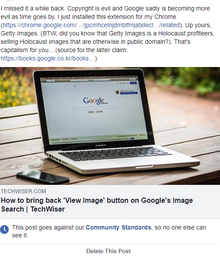Facebook[2], the social media behemoth, has been embroiled in several content management disputes. These have included claims of intellectual property[1] theft, with allegations of the platform copying videos from YouTube users. However, the launch of video-matching technology in 2015 and the Rights Manager tool in 2016 signaled Facebook’s commitment to better handle content that violated intellectual property rights. The platform has also faced backlash for hosting violent content, including imagery of war crimes. In response, Facebook introduced a policy to eliminate reported violent videos and began issuing alerts for graphic material. The advent of Facebook Live posed further complications, as it was utilized to document and disseminate crimes, prompting criticism over Facebook’s tardy removal of such material. Additionally, Facebook has faced censure for accommodating controversial content groups.
This article or section may need to be cleaned up or summarized because it has been split from/to Criticism of Facebook. |
Facebook or Meta Platforms has been criticized for its management of various content on posts, photos and entire groups and profiles. This includes but is not limited to allowing violent content, including content related to war crimes, and not limiting the spread of fake news and COVID-19 misinformation on their platform, as well as allowing incitement of violence against multiple groups.


